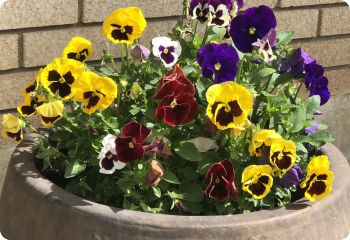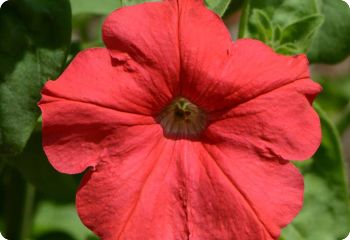Container Flower Seeds
by Diane Linsley and Andrea Steen
What are the best flower seeds for containers?
Container gardens are fun and easy to design. Containers make nice focal points in the garden. They can also bring the garden right up to the front door, making the entrance to your home more inviting.
Container Gardening Tips
1. Group plants according to their needs for water, fertilizer and sunlight.
2. Start with good-size transplants. Container gardens draw attention to themselves, so they need to look good right away. Seed-grown plants should be started indoors 4-8 weeks early.
3. Make sure the container has good drainage, unless you are creating a bog garden in a pot.
4. Use quality potting soil that includes fertilizer. Unlike plants in the garden that can spread out their roots in search of nutrients, container garden plants must be fed regularly. I've tried several brands, and the one that worked best was Miracle-Gro Potting Mix in the yellow bag (not the blue bag).
5. Mulch the surface of the container garden with cocoa shells, buckwheat hulls or aquarium gravel for an attractive finish that helps retain moisture.
6. Water your container garden at least once a day. In hot summer areas, it helps to choose drought-tolerant flowers.
7. Keep the plants deadheaded and pruned to look their best. In a container, there’s nowhere for scruffy plants to hide. If a plant isn’t working, replace it with something else. Although dwarf annuals are usually preferred, taller varieties may be used if they are pinched back before bloom to keep them compact. An example of this is cosmos, which comes in various heights.
Designing Container Gardens
Sun or Shade
Pots heat up in the sun, and the roots of plants can cook pretty quickly. I use very large pots (5 to 10 gallons) to keep the roots cool. If you have a lot of shade, consider shade-tolerant flowers.
Color Schemes
Color combinations are a matter of personal taste. But in general, bright and bold colors are preferred for container gardens because they stand out. Pastels can work if the container is to be viewed up close, like next to the front door.
Proportion
The size of the plants, including their flowers and leaves, should be balanced with the container. Many popular annuals come in dwarf forms that are suitable for containers.
In Contain Yourself, Kerstin P. Ouellet says, “As a rule of thumb you should aim for the plant portion to be at least twice as big as the visible part of the container.” But don't overplant because crowded plants will be prone to diseases and pests. Remember that plants grow!
Plant Habit
For a visually stimulating container garden, try a variety of plants with different habits. Kerstin Ouellet recommends combining upright plants with mounding and trailing plants. In hanging baskets, the upright element can be replaced with another trailer.
Container Garden Flower Seeds
1. Choose a focal point in a reliable bloomer:
2. Add a filler or a trailing filler:
3. Finish with a climber:
The vine can be trained up the chains of the hanging basket. In non-hanging pots, the vine is trained on a small trellis or an interesting tree branch for a sculptural touch. Push the branch into the soil, and anchor it with rocks to keep it stable.
4. Optional: Add a striking foliage plant like coleus or sweet potato vine.
Texture
Container gardens aren’t just for flowers. Beautiful potted gardens can be created by juxtaposing foliage plants with different leaf shapes and textures. Consider leaves that can be described by the following adjectives: wide, narrow, coarse, fine, shiny, fuzzy, heart-shaped or ferny. Use different shades of "green" to increase the visual delight.
Ornamental grasses are popular for container gardens because they add the dimension of motion. Stipa tenuissima is a favorite because it sways gracefully in the slightest breeze. Grasses are especially nice when combined with flowers.
In Gardening in Containers, Gary Keim says, “More than anything else, foliage gives body to container groupings. It provides the backbone and adds color to reinforce the floral display.”
Simplicity
Don’t do too many different things in one container, or it will look messy. Most containers look best with 3-5 different plants. But rather than adding more different species, you can also try using different colors of the same species. For example, try a mix:
Container Gardening Ideas
With so many ideas to choose from, where do you start? It might help to identify a theme or purpose for your container garden. Here are some ideas that feature the container flower seeds that we sell.
Hummingbird Container Garden
This is a fun one to put outside a main window of your house where you can observe the hummingbirds up close.
For more ideas, see Flowers for Hummingbirds.
Kitchen Herbs Container Garden
Herbs that are grown close to the house are more likely to be used. Popular herbs for container gardens include:
Add edible flowers:
Fragrant Container Garden
It’s nice to have fragrant flowers in window boxes or containers on the patio where can enjoy them up close. Here are some fragrant flowers for containers:
Include plants with fragrant leaves that you can rub as you walk by:
For more ideas, see Fragrant Flowers.
Rock Garden Container
I enjoy making my own cement planters for small, drought-tolerant perennials like sedum or hens & chicks. There are hundreds of possible rock garden plants for containers. For rock garden flower seeds, see Rock Garden Perennials.
Container gardening can quickly become addictive. Once you master the basics, you may find yourself staging whole groups of container gardens.
Related Articles
Fragrant Flowers - The most fragrant annual and perennial flowers from seed.
Flowers for Hummingbirds - The best flowers for attracting hummingbirds.
Drought-Tolerant Flowers - Save water and still have a beautiful garden.
Recommended Books
The Ultimate Container Gardener: All You Need to Know to Create Plantings for Spring, Summer, Autumn, and Winter by Stephanie Donaldson
Contain Yourself: 101 Fresh Ideas for Fantastic Container Gardens by Kerstin P. Ouellet
Gardening in Containers: Creative Ideas from America's Best Gardeners by Fine Gardening Design Guides
Seeds

